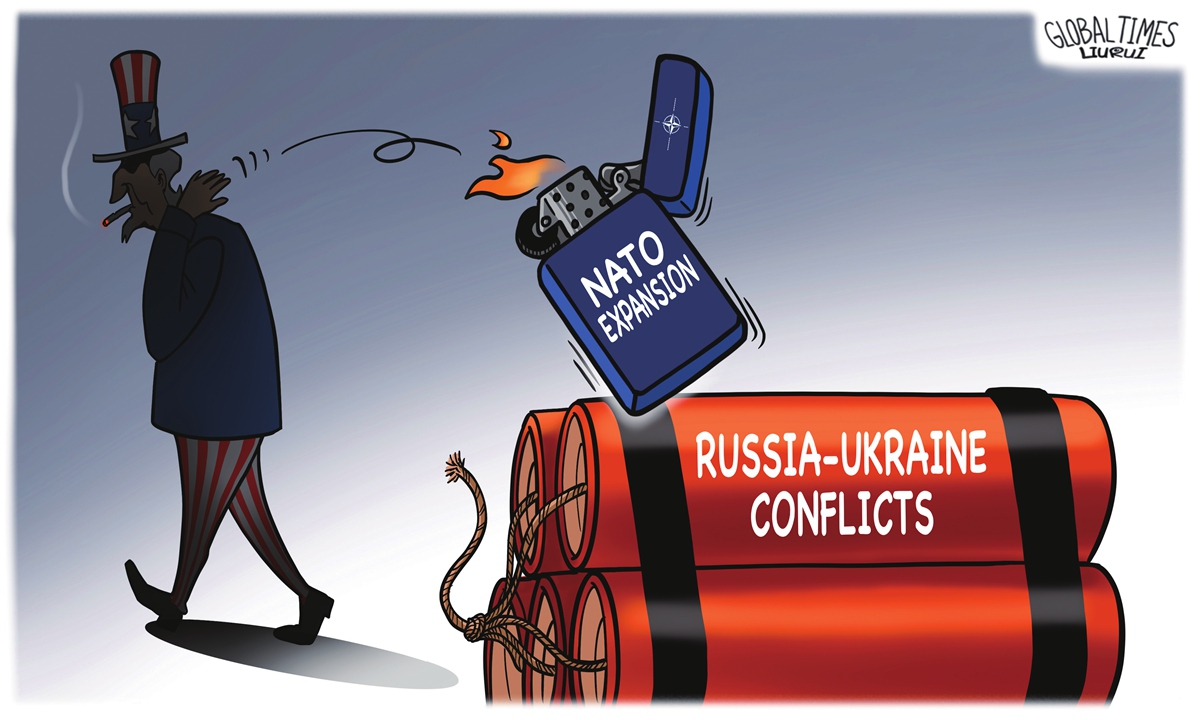Shifting from defensive to offensive, military bloc NATO won't bring security and peace

NATO Expansion Illustration: Liu Rui/GT
In the Russia-Ukraine geopolitical conflict, there is a very noteworthy phenomenon. Western sanctions against Russia go beyond the level of national governments, and many promoted by private capital and multinational institutions, ranging from international credit cards to ice cream taste, from banning works by Russian composer Pyotr Ilyich Tchaikovsky to International Cat Federation blocking Russian cats from competitions.This was not the case even at the peak of the Cold War. This is the first time when attempts to isolate a country have gone beyond nation-state actions, leaving the dominant role to large private capital - financial capitals and technology corporations.
Behind this phenomenon, we can see the strong links between political power and economic groups in the Western world. Especially in the field of public opinion. The mass media used to be just the "megaphone" of interest groups, but today they have become capital groups themselves after being combined with internet platforms. Russia is a market that has not yet been fully "colonized" by Western capital, and at present, power and capital are trying to conquer it.
The above phenomenon may be a new trend in future international politics. Although both the US and Europe are a divided society, there are quite a few forces opposing this trend - not the waning left-wing movement in the West, but the right-wing forces represented by French far-right leader Marine le Pen, and former US president Donald Trump - but economically, the West's confrontation with Russia and even with China will be increasingly intensive.
In fact, the new economic Cold War between the West and Russia has already begun. I'd like to call it a fight for the "dollar hegemony." In this sense, it is similar to, but more intense than, the trade war Trump launched against China five years ago.
The West's sanctions against Russia are also an international political version of the "cancel culture" prevailing in the West. The so-called cancel culture is just another phrase for "censorship." In the post-war Western society, the word "censorship" isn't accepted, thereby the term "cancel culture" being created.
As a matter of fact, the West's "censorship" of culture and politics in Latin America and the Arab world has always existed. But in the Russia-Ukraine conflict, such phenomenon has become more noticeable. The only difference between "cancel" and "censorship" is that "cancel" is not only promoted by the governments, but capital, mass media outlets, and society. A typical example is that the information released by Russia will be blocked by mass media and information platforms such as Twitter, and all those who do not oppose Russia will encounter "cancel culture" in Western society.
The Western discourse on the Ukrainian crisis is a typical "dehistorization" (historical nihilism) narrative. For example, they said that Russia's military operation is like Germany's invasion of France during World War II, they said Russian President Vladimir Putin is Hitler, in a bid to portray the image of Russia as an "invader." But they deliberately ignored the complex historical background of the conflict. When Russia is described as evil, "canceling" Russia will be "rationalized."
NATO says its purpose is to defend the security of Europe. If it is true, when the Soviet Union collapsed, naturally, NATO should have also been dissolved. But the fact is just the opposite. Instead, NATO is expanding. It has completely changed from a defensive organization to an offensive bloc. No military alliance will bring security and peace, and what will be triggered is only war. Therefore, it is not good news for the world that countries like Finland are seeking to join NATO.
What the West is doing to Russia today can be seen as a rehearsal for what they will do to China in the future. I have no doubts about the intention of the US to "bite off" China's interests on the Taiwan question. Just as what NATO has done in Europe, the US is attempting to exploit the Quad to counterbalance China's development in Asia. The Quad is very much like an Asian NATO, but it lacks the energy of NATO because of the seemingly contradictory fact: Even though the tensions between India and China have ramped up, India still hopes to maintain economic and trade relations with China, and won't blindly follow Washington.
Will the Russia-Ukraine conflict lead to World War III? I think the risk is there. In my view, US President Joe Biden is not a leader capable of handling the extremely sensitive, delicate, complex situation at the moment. His series of practices showed the world a decline of US leadership and a shift in world power, just as it was in the 1940s when Britain was on the decline and the US was on the rise.
We are at a time when the world order is collapsing and all the rules based on the Bretton Woods system are disintegrating. The moment the UN General Assembly voted to suspend Russia's membership of the Human Rights Council was an embodiment of this reality. The new order may take years to re-establish, but we don't yet know when and what it will look like.
The author is a professor of the Latin American Faculty of Social Sciences, Argentina. opinion@globaltimes.com.cn
